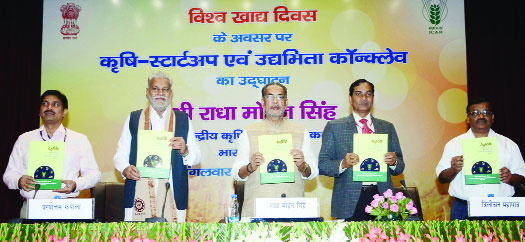This World Food Day, the two-day Agri-Startup and Entrepreneurship Conclave held in the capital discussed India’s progress so far towards removing hunger from the country as well as government’s various initiatives to incentivise the agriculture sector.
The Union Minister of Agriculture and Farmers’ Welfare Radha Mohan Singh, believes that efforts of many farmers and the techniques developed by the Indian Council of Agricultural Research (ICAR) have contributed to an increase in agricultural production and food security to remove the suffering from hunger and ensure food security and a nutritious diet for all. Zero hunger could save the lives of 301 million people a year and can help build a safer, more prosperous world for everyone. He was speaking at the the two-day Agri Startup and Entrepreneurship Conclave on the occasion of the World Food Day celebrated at the NASC Complex, Pusa in New Delhi with a theme—‘Our actions are our future-A zero hunger world by 2030 is possible’.
The minister said, “The purpose of celebrating this day is to demonstrate our global commitment to achieve the goal of creating ‘Zero Hunger World’ by 2030. The government aims to transform India’s agricultural sector to contribute to the achievements of the global environmental objectives and has launched a new project in association with FAO, India office—‘Green Agriculture: Transforming Indian agriculture for global environmental benefits and the conservation of critical biodiversity and forest landscapes.”
According to the fourth advance estimate, the food grain production is estimated at 284.83 million tonnes in 2017-18, an increase of over 20 million tonnes as compared to 2013-14. The horticulture crops, which contribute significantly to the nutritional security, have witnessed a record production this year at 307 million tonnes. The minister pointed out that India occupies the top spot in the horticulture production. In the year 2015-16, the production of pulses was 16.25 million tonnes, which increased to 25.23 million tones in the year 2017-18, which is about 9 million tonnes higher as compared to the production achieved in the year 2013-14.
The role of high quality crop variety, seeds and technology has been significant in increasing production. Singh added that 795 crop varieties were released for production during 2014-18 as compared to 448 crop varieties during 2010-14. The demand and production of breeder seeds during 2013-14 was 8,479 tonnes and 8,927 tonnes respectively which rose to 10,405 tonnes and 12,265 tonnes in 2016-17.
Addressing the agricultural entrepreneurs present at the conclave, Singh informed that the government started the startup program to create an atmosphere for the agriculture startups to provide appropriate support to set up the enterprises. In this context, the Skill India Scheme was launched by the government on a large scale. He explained that there is a tremendous potential for startups in the field of seeds and plant production, food processing and post-mortgage management, veterinary, farm machinery, poultry, fish production, biological products, bioplasty and so on.
According to statistics, there is a requirement of 22 lakh skilled youth in the agricultural sector and to meet this demand, training and skill development is being conducted in various employment areas with the help of the agriculture department, ICAR and the Krishi Vigyan Kendras (KVKs). “Though a record of food grain production has been established in the country, the government is working very fast on the value chain. The recently launched Pradhan Mantri Kisan Sampada Yojana aims to create world-class food processing infrastructure. This is expected to leverage investment of five billion USD, benefit two million farmers and generate more than half a million jobs over the next two years.”
To attract the youth of the country towards agriculture, a project called ‘Arya’ is being run through the KVKs and the Farmer Fest program is also playing a leading role in this direction.
Singh also explained that through the mega food farms the government plans to link agro-processing clusters with key production centres. This will offer immense value proposition in crops such as potato, pineapple, oranges and apples. The farmer groups are being encouraged to set up units in these parks, thereby reducing wastage and transportation costs, and creating new jobs.
On digitalisation in the domain of agriculture, the minister commented, “We plan to link our villages through broadband connectivity, within a clear timeframe. We are digitalising land records and providing various services to the people on mobile platforms. These steps are building momentum towards real-time transfer of information, knowledge and skills to farmers. The e-NAM, our national agriculture e-market, is connecting our agricultural markets nationwide, thereby giving our farmers the benefit of competitive pricing, and freedom of choice.”
Writer: Team Viva
Courtesy: The Pioneer








 OpinionExpress.In
OpinionExpress.In















Comments (0)